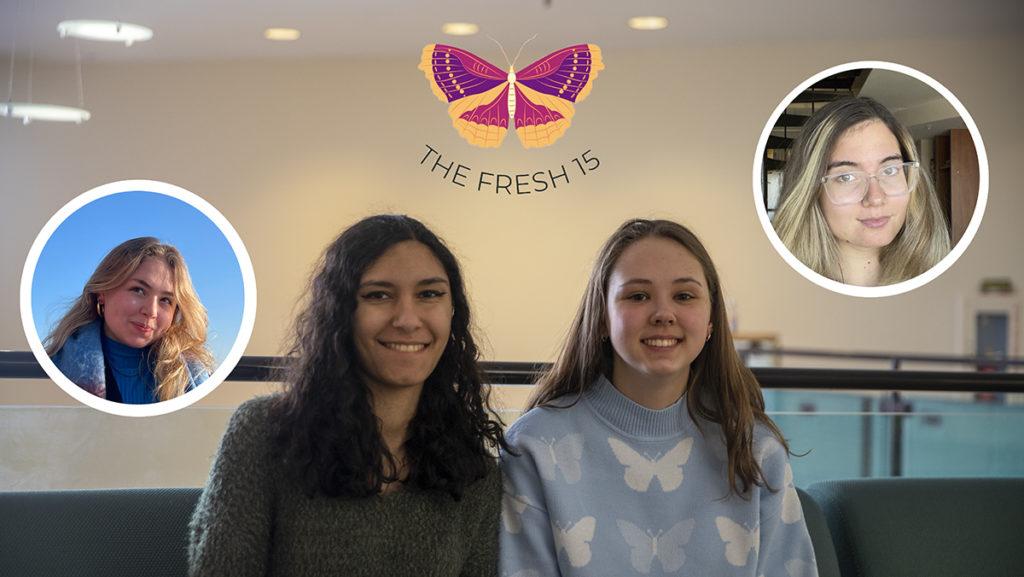Four Ithaca College students created a social media campaign called The Fresh 15 to bust the myth that students gain 15 pounds in their first year of college and to identify other aspects of college to focus on.
Sophomores Julia Freitor, Jaime von Bartheld, Katie Miller and junior Roxanne Palladino needed a campaign subject for their Introduction to Public Relations class in Fall 2022. That was when they created The Fresh 15 — a play on the term freshman 15. However, the four did not stop the campaign when their class ended. As part of their continued campaign, the group had teamed up with a production class to release a Public Service Announcement on Youtube and created social media posts, like “15 ways to look cool and mysterious while alone in the dining hall” or “15 ways to de-stress” on their Instagram and Tiktok to divert students’ attention to other experiences, like extracurricular activities and friendships.
“[We were] trying not [to] make light of it but just change the way people were thinking about it, because it had such a negative connotation … but we wanted them to have a positive mindset,” von Bartheld said. “Everyone knew what you were talking about if you mentioned [freshman 15] and we went into it trying to reframe it.”
Jen Huemmer, associate professor in the Department of Strategic Communication, taught the class and said she had mixed feelings about the campaign at first because she thought it was broad. However, as the group progressed with the project, Huemmer said she started to feel more confident about the campaign.
“I was a little worried,” Huemmer said. “[But] when I started to see what they created, I was super impressed.”
When the group started their research, they quickly learned that the freshman 15 does not exist. Many studies have been conducted on college students and weight gain, each yielding different results and conclusions. But, the general consensus is that while weight gain may occur, it is not in unhealthy amounts. A study done by the National Library of Medicine collected peer-reviewed articles and data studies published between 1980 and 2014 on PubMed, Embase and PsycINFO. The meta-analysis showed that half of first-year students gain between 2.7 and 13 pounds while 15% of students lose weight.
Freitor said students’ fear that they will gain weight in their first year at college is something the campaign works to de-stigmatize. Palladino said students are already dealing with a host of changes and the societal pressure to maintain a certain weight only exacerbates that stress.
“That kind of blew our minds because of how pervasive that idea [of the freshman 15] is and it’s not even a real thing,” Palladino said. “So we wanted to get that message out there. … First-year students have so much on their plates already.”
The group traced the beginning of the myth back to 1981 when the New York Times published an article that featured a young celebrity, Jodie Foster.
“When Miss Foster talked with reporters on Wednesday afternoon, she looked like many other freshmen with complexion pallid from too many hours spent over books,” the article said. “She appeared to have what is known here as the ‘freshman 10,’ the 10 pounds many freshmen gain in their first weeks here.”
Then, in 1989, Seventeen Magazine, which is aimed at teenage girls, published an article warning high school students about what the magazine called the freshmen 15. The article began in bold with, “How to avoid the first-year fat attack? Here, advice from a pro: Traci Watkins, now a sophomore at Westminster College in Pennsylvania who survived freshman year without putting on a pound.”
The negative outlook on small amounts of weight gain continues to show up online, often in blog posts and social media but websites like Healthline and WebMD contribute.
Von Bartheld said the awareness of the freshman 15 can start even sooner than students’ first year of college. Freitor said the campaign on Instagram even led to a high school senior from Freitor’s hometown reaching out to Freitor and thanking her.
“[The worry] was taking a toll on her,” Freitor said. “She was talking so much about her personal life, and it was really moving to see. It proved that this is something that people are really concerned with but also this is something we can truly tackle.”
When deciding on a logo for the campaign, Miller said the group wanted something that would be symbolic of a fresh start.
“Our logo is a butterfly, which we feel represents ripple zones and new, positive beginnings,” Miller said. “It is a chance for people to kind of grow and feel more comfortable.”
Huemmer said she believes a good logo is key to any social media campaign and that the butterfly was spot on.
“It was simple, but engaging,” Huemmer said. “Which is what we try to aim for with social media content and a campaign like this.”
Even though the class is over, the group said they plan to continue their work on campus and through social media.
“I feel like it’s not so much about our campaign as it is the message,” von Barthheld said. “The messaging is very important to spread. It’s important that people aren’t so scared. … We want people to stay healthy and do what’s right for them. Like, your body’s still changing. So, [gaining weight is] not something to try and fix.”







